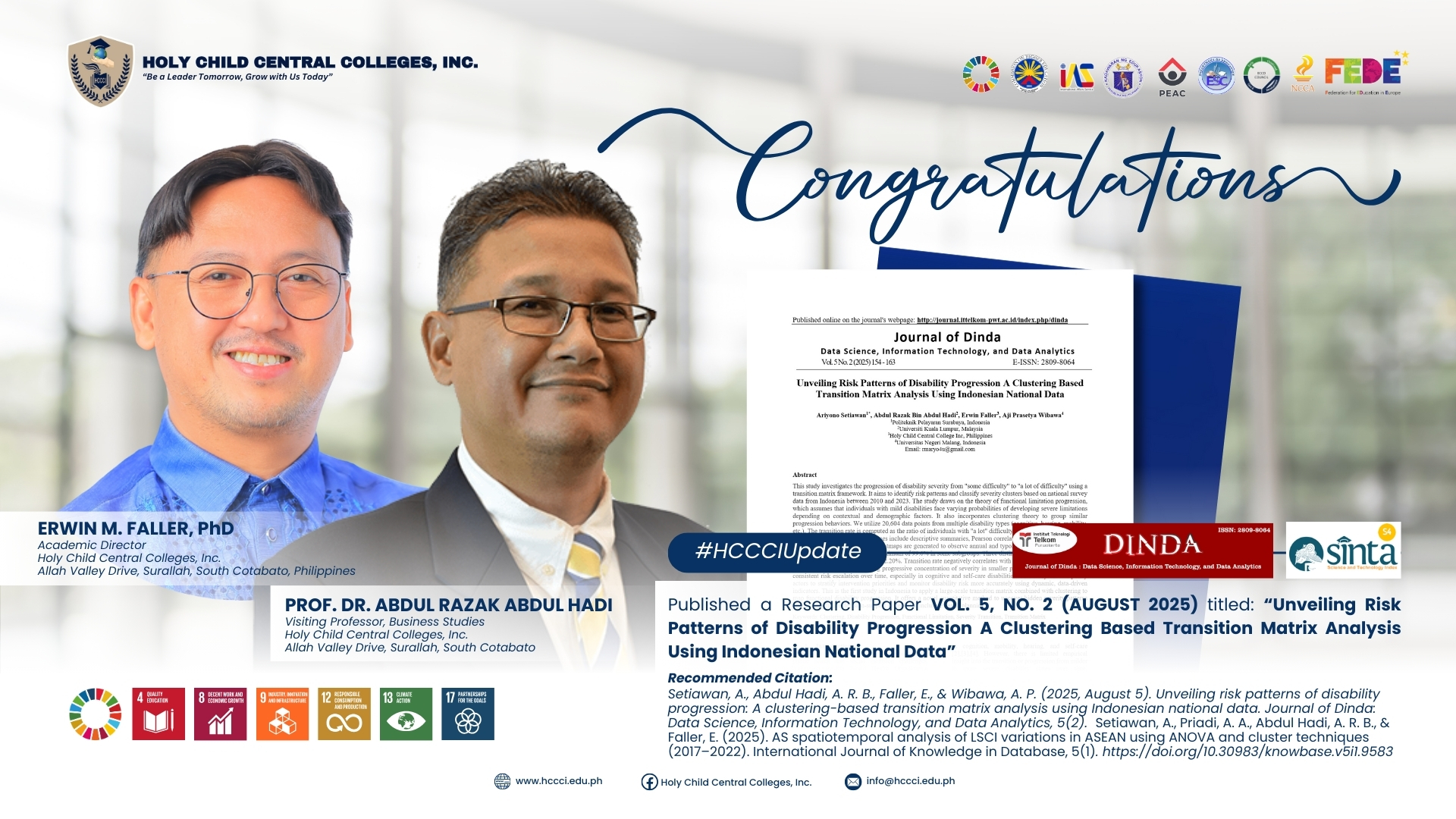𝐔𝐧𝐯𝐞𝐢𝐥𝐢𝐧𝐠 𝐑𝐢𝐬𝐤 𝐏𝐚𝐭𝐭𝐞𝐫𝐧𝐬 𝐨𝐟 𝐃𝐢𝐬𝐚𝐛𝐢𝐥𝐢𝐭𝐲 𝐏𝐫𝐨𝐠𝐫𝐞𝐬𝐬𝐢𝐨𝐧: 𝐀 𝐂𝐥𝐮𝐬𝐭𝐞𝐫𝐢𝐧𝐠-𝐁𝐚𝐬𝐞𝐝 𝐓𝐫𝐚𝐧𝐬𝐢𝐭𝐢𝐨𝐧 𝐌𝐚𝐭𝐫𝐢𝐱 𝐀𝐧𝐚𝐥𝐲𝐬𝐢𝐬 𝐔𝐬𝐢𝐧𝐠 𝐈𝐧𝐝𝐨𝐧𝐞𝐬𝐢𝐚𝐧 𝐍𝐚𝐭𝐢𝐨𝐧𝐚𝐥 𝐃𝐚𝐭𝐚
A groundbreaking international research initiative has been launched under the study “Unveiling Risk Patterns of Disability Progression: A Clustering-Based Transition Matrix Analysis Using Indonesian National Data.” This project seeks to uncover the dynamics and risk trajectories of disability progression using advanced data-driven methodologies. More than an academic pursuit, the study has a vital social mission: to provide evidence that will inform inclusive policies and long-term interventions for persons with disabilities.
The research is the result of strong academic collaboration across Southeast Asia, led by Ariyono Setiawan of Politeknik Pelayaran Surabaya (Indonesia), Aji Prasetya Wibawa of Universitas Negeri Malang (Indonesia), Abdul Razak Bin Abdul Hadi of Universiti Kuala Lumpur (Malaysia), Visiting Professor for Business Studies and Accountancy at Holy Child Central Colleges, Inc., and Dr. Erwin M. Faller, Academic Director of Holy Child Central Colleges, Inc. (Philippines).
By applying a clustering-based transition matrix analysis to Indonesian national data, the team aims to identify how disability progression unfolds across different demographic and socioeconomic contexts.
The findings are expected to provide governments, institutions, and stakeholders with the knowledge to design inclusive health, education, and employment programs that respond directly to the lived realities of persons with disabilities.
This initiative strongly aligns with the United Nations Sustainable Development Goals, particularly SDG 3 (Good Health and Well-Being), SDG 4 (Quality Education), SDG 8 (Decent Work and Economic Growth), SDG 10 (Reduced Inequalities), and SDG 17 (Partnerships for the Goals).
It highlights how research can address health inequities, reduce barriers in education and employment, and promote equality, all while strengthening international partnerships for sustainable development.
The importance of this research cannot be overstated. Disability is both a health and a social issue, deeply connected to access, opportunity, and dignity. By unveiling risk patterns and predictors of disability progression, the study empowers policymakers to make data-informed decisions, ensuring that no one is left behind.
Moreover, this collaboration demonstrates how cross-border, interdisciplinary research can create tangible impact. With Indonesia, Malaysia, and the Philippines joining forces, the study underscores the transformative role of ASEAN partnerships in shaping more inclusive and resilient societies. For Holy Child Central Colleges, Inc., the participation of Dr. Faller and the active engagement of Visiting Professor Abdul Razak further mark the institution’s growing presence in international research and its commitment to contributing to global conversations on equity and inclusion.
Ultimately, this project is not just about uncovering patterns in data—it is about advancing the vision of a society where persons with disabilities are empowered, valued, and fully included in the journey toward sustainable development.
